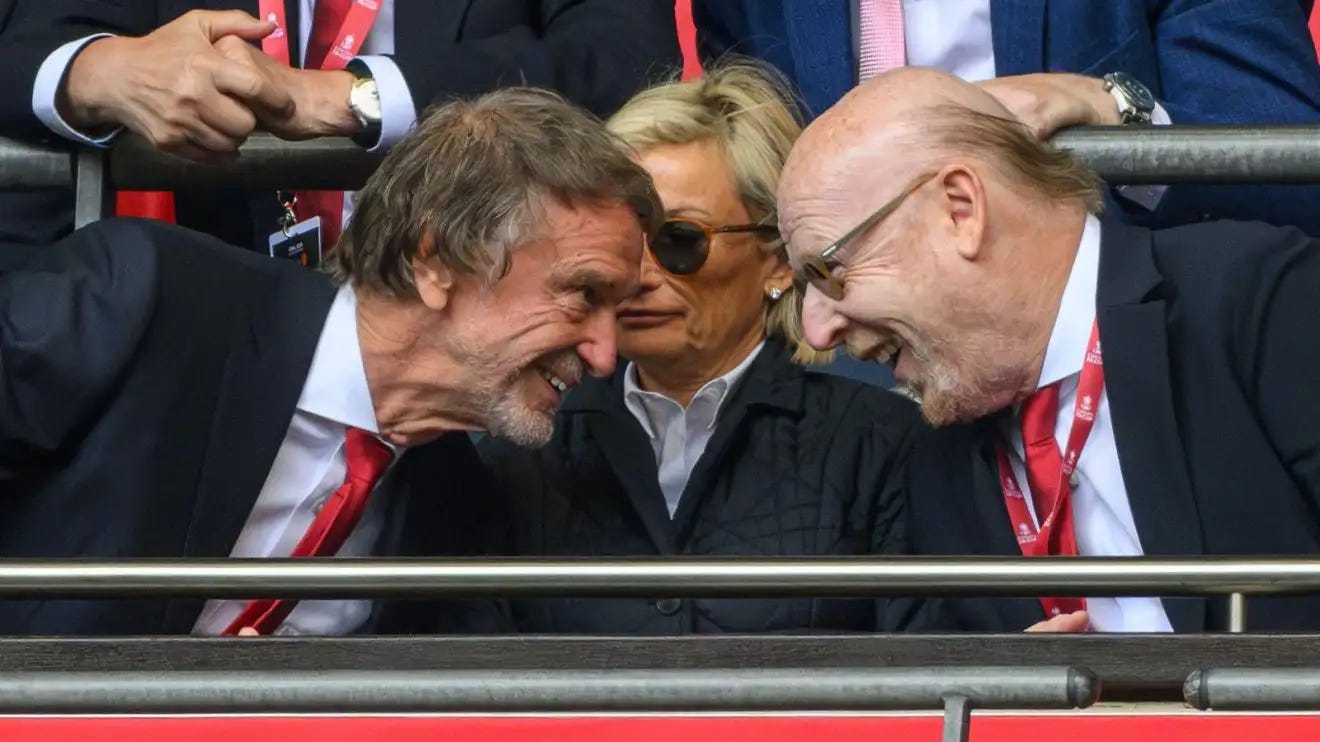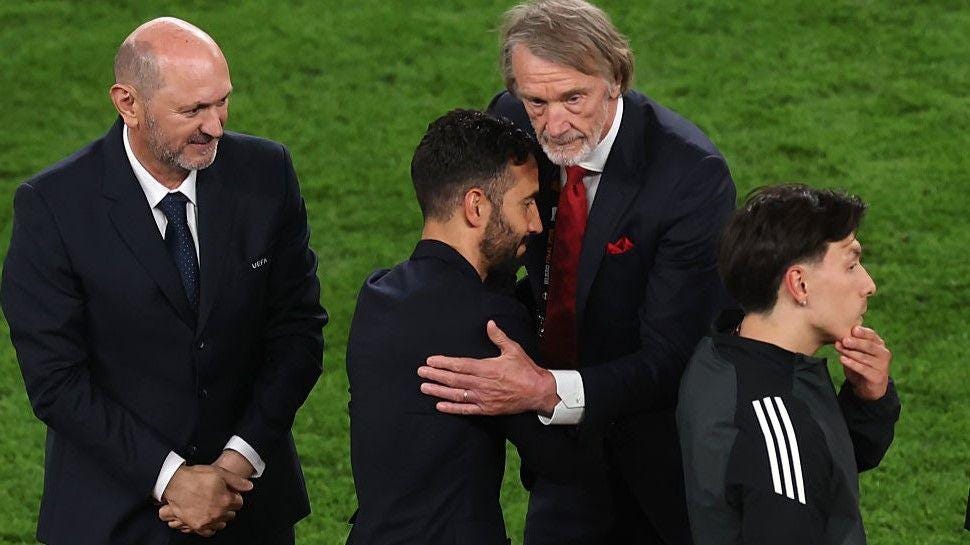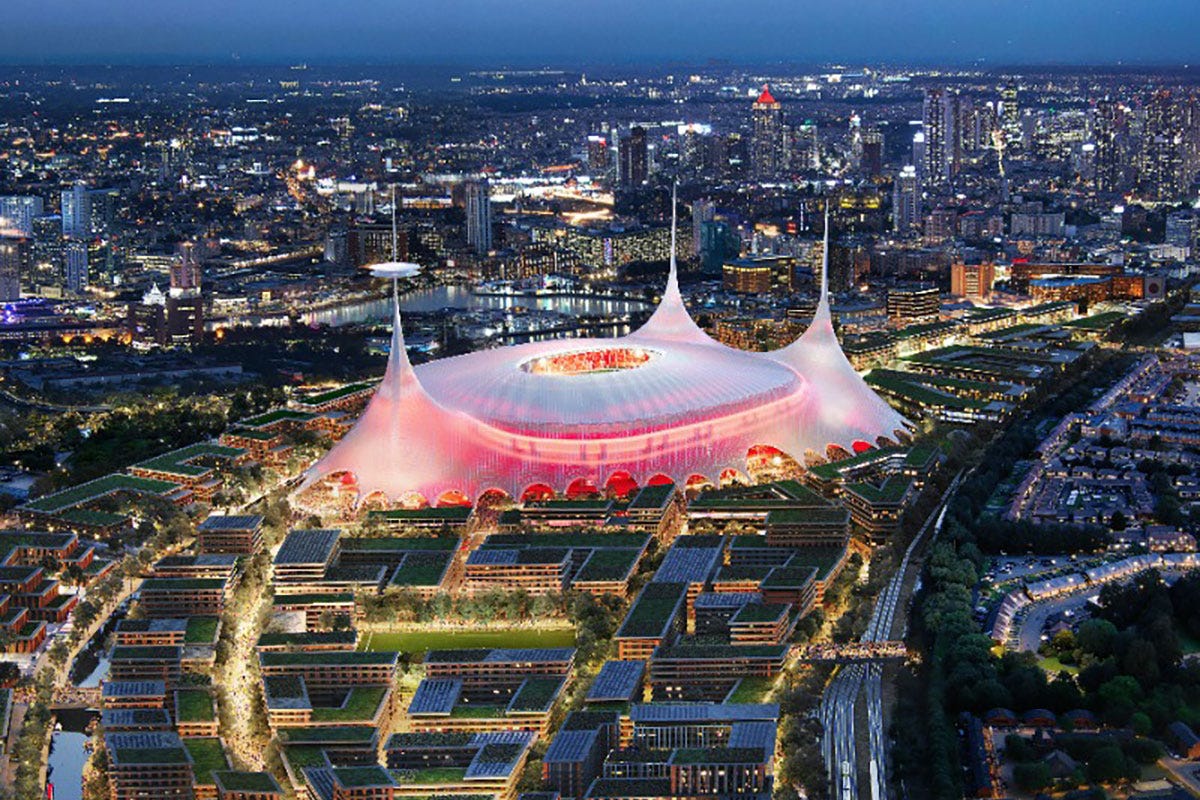Blood Red Ink, Black Bottom Line
Record revenues, sixth straight loss, and a club that has forgotten what good looks like
Opening whistle
I watched those numbers arrive like a looping cross to the back post, plenty of height, all the shine, begging to be nodded in. Then, as ever with Manchester United these days, the finish sailed wide, and the groans rolled round Old Trafford like a cold wind on a February night. Record revenues, they tell us, a grand £666.5 million, the sort of top line that would make a City banker clap. Yet there it sits, another loss, the sixth on the spin, thirty three million reasons to ask what on earth is going on at a club that used to be the byword for certainty.
From my seat at It was always...Football, I will put it plainly. United talk a big commercial game, they still sell the dream to partners, they still fill the place to the rafters, they still flog shirts at a rate of knots. But a club is not a shop front, it is a team, a plan, a culture. And when the culture creaks, money runs through your fingers like rain through a leaky roof.
Manchester United finances, the headline no one can miss
United have posted the highest revenue in their history, a towering figure built on two pillars. Matchday income of £160.3 million, the biggest seen by an English club, and commercial money of £333.3 million, topped up by the type of shirt sponsorship that turns heads in boardrooms. That is big, no question. Broadcasting income fell, the price of sitting out the Champions League, yet the other streams puffed out their chests and carried the day.
Here is the sting. Even after all of that, United still lost money. Thirty three million out the door in a season when the tills were singing. You can dress that up with phrases about resilience and transformation, you can talk about headwinds, but supporters are not daft. If record takings still end in red ink, your operation has structural problems.
Sixth annual loss, a habit that speaks louder than any press release
One off blips happen in football. Six in a row is not a blip, it is a pattern. The loss did shrink from the previous year, and that tells you there are adults in the room counting pennies. Operating losses narrowed sharply too. Fine. But when you are celebrating smaller defeats, something fundamental is off. United have become the team that wins the possession stats and loses the match. Plenty of ball, no cutting edge.
Wages down, jobs gone, but the bill still bites
United’s wage bill fell to about £313 million, the lowest since the pandemic era. That is what happens when you miss the Champions League bonuses and when the guillotine drops on headcount. Hundreds of jobs gone. You can call it streamlining if you wish. It reads as a club trying to fit into a suit that used to be three sizes bigger.
There is a hard truth here. United have paid a fortune to be average. You can shave salaries, you can send high earners on their travels, you can talk about leaner structures. But if the recruitment is scattergun and the football is muddy, the wage bill still feels like a millstone. It is not the absolute number that kills you, it is what you get for it. United have been paying champagne wages for lemonade football.
Exceptional costs, the receipt that never ends
Then come the exceptional items, the most predictable surprise in football accounting. About £36.6 million on the line marked exceptional, a mix of pay offs to a departed manager and staff, and the broader reshuffle of the operation. Only at United could the exit costs be a decent winger in another universe. The club extended a manager, then paid to remove him within months. That is not strategy, that is a coin toss.
When you add in the removal of a sporting director after a cup of tea and a glance at the training ground, you are looking at a habit of changing your mind after the ink is dry. The bill for indecision is always paid with interest.
Debt, cash, and the revolving door of credit
United’s gross debt sits around £637 million, up in sterling terms. The shape of the balance sheet shows borrowings on a revolving credit facility that swelled during the year, with hundreds of millions flickering in and out. That is the corporate equivalent of living off the credit card to get through month end. Cash reserves closed the year at a touch over £86 million, helped by an injection from the new power in the boardroom. Better than running on fumes, but hardly a war chest for a season without European football.
Tell me this, where is the long planned glide path to a cleaner balance sheet. Every year we hear that the debt is manageable, every year we watch the pitch throw up weeds. Debt can be managed when the football is ruthless, when the trophies bring in prize money and the brand sells itself on the grass. When the team struggles, debt becomes a drumbeat that never quite fades.
Transfers, the cash waterfall that runs uphill
United spent roughly £279 million in hard cash on transfers during the season. That is a club record by a distance, with a net outflow that would make a sovereign fund pause. And still they chase the game. It is the old story. Buy dear, sell cheap, hold wages for players who do not fit a coherent plan, then complain about the market. Recruitment has not been a football department, it has been a carousel.
The amortisation line tells its own tale. The past follows you like a shadow, because instalments for older deals still bite. When you are paying for yesterday’s misreads while trying to fund a rebuild, every pound has a cousin dragging its heels. It is no use winning deadline day if you lose the accounting year.
Matchday and commercial strength, a crowd that still turns up
You must hand it to the faithful. Thirty games at Old Trafford, and the turnstiles clicked at a premium. Average takings per match remain eye watering. Ticket prices have risen, hospitality keeps its sheen, and the place still sells nostalgia like nobody else. On the commercial side, United remain a colossus. Corporate partners queue for a slice of the theatre, the front of shirt stays hot property, the brand is global. That part of the club still looks like the old machine.
But here is the rub. If your strongest arms are matchday and commercial, and your legs from broadcasting are wobbling because the football has sunk, you are building the house on uneven ground. Commercial pull is not a trophy, it is a by product of success. It can carry you for a while, but if the team keeps finishing in the wilderness, even the gloss loses its shine.
Broadcasting income and the price of underachievement
Broadcasting income dropped by close to fifty million. That is the coin you leave on the table when you miss the Champions League. Europa League runs add a sprinkle of cash, but European Thursdays never pay the same. Worse still, there will be no Europe at all in the current campaign. The club guides revenue at best flat, possibly lower. That means another year watching rivals stride away.
Remember when United were the financial benchmark. Now you hear noise that Liverpool and City will sit above them on revenue, that Arsenal may join the fun. A decade ago United enjoyed a clear lead, a hundred million cushion at times. That cushion has been burst with pins of poor decisions.
Profit and Sustainability Rules, a chess match with a stopwatch
United’s pre tax loss sits around forty million, the figure that starts the PSR maths. The clever bit is that calculations for compliance are run through a subsidiary, a legal quirk that might soften the glare in the near term. But the real game is not in technicalities. The real game is building a squad and a wage profile that lets you attack windows without sweating the auditors. When you spill so much on transfers and severance, you eat the headroom you claim to be creating.
Market reaction, the City that shrugged
Shares took a clatter on the day the figures landed. A dip in the market price is hardly a surprise when you present a paradox, record revenue and a loss, a club that talks about transformation yet guides for less income next time round. Investors can smell drift as sharply as supporters can.
Culture, leadership, and the football truth you cannot spreadsheet
You can chop a budget, you can trim a wage bill, you can renegotiate a contract with a sponsor, you can juggle a facility with your bankers. You cannot spreadsheet your way out of a lack of clarity. United have operated like a team who change the captain at half time and swap the formation with every throw in. There is talk of long term vision, of building for the future, of streamlined operations. Grand phrases, but the real test is what eleven men look like on a wet Sunday.
A winning football club spends well because it knows what it needs. A losing one spends because someone shouts loudest. United have been the latter too often. If your idea of a reset is to swing from one manager profile to another, to clear a department then rebuild it, to pay off mistakes and call them exceptional every year, the accounts will keep telling the same story. Fewer duds, more cohesion, that is the path. It sounds simple because it is.
Supporters, the only constant that still pays in full
You could hear the faithful long before you saw them last season. They still stand, they still sing, they still fill their Saturdays and their wallets for a club that once made them proud. They deserve better than a numbers game that feels like a late scramble in a crowded box. They deserve a plan, visible and ruthless. They deserve a team that fits together, that knows its shape, that buys what it needs and sells what it does not, that treats the manager’s chair like a job rather than a revolving stool.
The road ahead, potholes and an open goal
Next year’s guidance says revenue will drift around the mid six hundreds without European nights. Costs will be lower as the redundancy wave shows through and as some big earners leave the scene. The club will speak of green shoots, of EBITDA in a healthy range, of the benefits of the programme. All of that might be true in the narrow sense. But do not be fooled by tidy margins if the football is dismal. The fastest way to fix these accounts is the oldest way. Win more matches. Get back to Europe. Stop paying for your mistakes, stop making new ones, start buying players for a system that is not rewritten every time the wind changes.
If United can marry their commercial heft to a football brain, they will climb again. They still have pulling power, they still have a stadium that can roar, they still have a global reach that others envy. But you cannot keep calling mediocrity a plan. Record revenues with a loss is not a badge of honour, it is a neon sign that your house is pointing the wrong way.
Final whistle
So there you have it. United as a ledger looks impressive at the top, then leaks at the bottom, like a goalkeeper with soft wrists. The wage bill has been shaved, the exceptional costs keep nipping, the debt sits there like an unsmiling centre half, the transfers burn cash, and the broadcasting money punishes failure. Supporters are told to trust the process. They will trust results.
For all the talk, the club remains a paradox. A retail juggernaut, a matchday marvel, a commercial magnet, and a football side that finished miles off the pace. If you are building a museum, this is perfect. If you are trying to win a league, it is nowhere near enough.
United need less theatre and more football. They need decisions that age well. They need recruitment tied to a clear idea. They need the courage to stop repeating the same season on a loop. Record revenues cannot keep covering for poor choices. The table never lies, and neither do accounts. At Old Trafford, the scoreboard and the spreadsheet are finally telling the same story.




